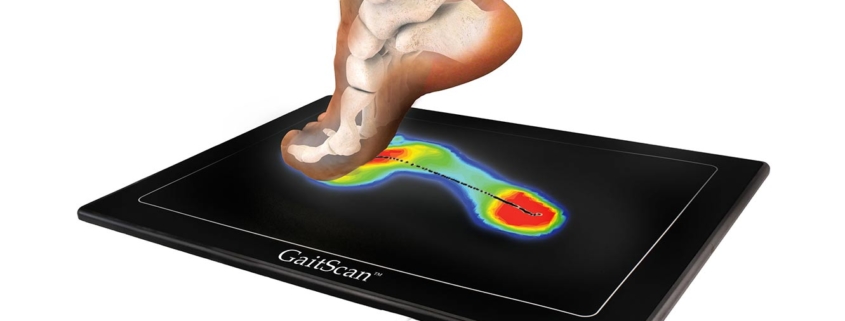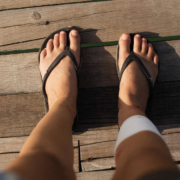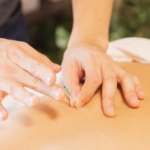Custom Foot Orthotics
Many foot problems can be directly attributed to collapsed/fallen arches or other biomechanical issues such as pronation (rolling in and collapsing of the arches) or supination (rolling outward of the ankles and raising of the arch). Many of these biomechanical faults can be genetic in origin and many patients do not know there is a problem, usually until pain manifests. Orthotics can help to provide relief from conditions of the foot, ankle, knee, hips and lower back including, but not limited to:
- Plantar Fasciitis
- Bunions
- Ankle sprains
- Achilles’ tendinopathy
- Shin Splints
- Low back pain
How are custom orthotics made?
If you are an existing patient, you will come in for the first appointment, a biomechanical assessment that includes a gait scan analysis, that looks at your feet when standing, and walking. Next, the practitioner will take a foam cast of your feet, in the proper “neutral position” which allows the orthotic lab to customize the orthotic to your feet. Then we send out the gait scan analysis along with the foam cast to The Orthotic Group’s lab and in about 2-3 weeks, your orthotics will be delivered to the clinic.
If you are a new or existing patient, you will need to check with your extended benefit company to get an understanding of the requirements they may have for your orthotics to be reimbursed before booking in for the first orthotic appointment, the Biomechanical assessment.
You would then book a fitting appointment roughly 2-3 weeks after the biomechanical assessment. In this appointment you will receive your new orthotics and will be able to try them in your shoes and the practitioner will ensure they are fitting correctly. They will also be able to discuss how often you should start wearing your orthotics for and holding up to wear and tear. After this, you can book in maintenance/checkup appointments if you have any concerns or issues with the custom orthotics.
If you are a new patient to the clinic, we would have you book an initial appointment first so that your practitioner can get your health history, do a proper assessment and be able to recommend a treatment plan. If the practitioner believes custom orthotics would benefit your treatment and condition, then they would book you the biomechanical assessment.
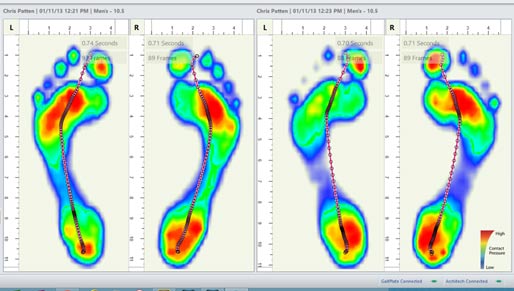
Orthotic Fees
At the first biomechanical appointment, along with your appointment fee we will also collect a non-refundable deposit that goes towards the cost of the orthotics (50% orthotic cost). At the fitting appointment, you will pay your appointment fee and the remaining 50% of the orthotic cost. You will also be given your Orthotic package that will include receipt of payment, biomechanical paperwork, proof of manufacturing and if applicable any paperwork that is required by your extended benefit plan.
Adjustment Period
There is an adjustment period after you receive your orthotics for your body to readjust to the correct position, generally about two weeks. Your body will have adapted to the ground in a certain way when you did not have orthotics, and now must re-learn the correct position. Accompanying your orthotics, our practitioners will provide you with an instruction sheet that suggests the length of time that orthotics should be worn each day until your body has had the chance to readjust. It is important, once you have gone through the adjustment period, to wear your orthotics as prescribed and on a continuous basis to ensure that your body maintains that correct position and to help alleviate pain.
Shoes
The importance of shoes cannot be over-emphasized here. The best custom orthotics will be ineffective if you wear them with shoes that are not stable. Custom orthotics can be transferred into different shoes that you may wear, however there may be certain shoe types that do not comfortably accommodate your orthotics. A good quality shoe will provide adequate support for only about 8 months if you wear the shoes daily. While the shoes may appear in good condition, the foams in the mid-sole lose their ability to “bounce back”. Replacing your shoes on a regular basis is on the most important things you can do for your foot health.
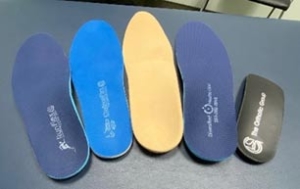
Placing Orthotics in the shoe
The most important thing to do when inserting your custom orthotics, is to remove the insole that is already in the shoe. Most insoles have a lip on the back, and this will prevent the custom orthotics from sitting all the way back in the shoe and may lead to arch or heel irritation. After you have placed your custom orthotic into your shoe, you want to make sure that the heel sits all the way back against the heel of the shoe. If there is a gap between the orthotic and the shoe, this is an indication that the shoe is too narrow for your orthotic and your foot.
How long can I expect the custom orthotics to last?
No orthotics are not indestructible and will wear out eventually or you may even outgrow them. Generally, custom orthotics last 1 to 5 years and determining if they need to be replaced comes down to appearance and how they are used. Some of the most relevant factors are:
- How they are used: if you do a lot of high impact activities, they will wear out faster
- How often they are worn: It is recommended to wear your orthotics everyday, and many people choose to get more than one pair to accommodate for dress shoes, running shoes etc
- Getting older: Your feet will not be the exact same size and shape, as they will continue to grow and flatten as you get older.
- Signs of damage: scratches and scuffs are fine, but if you notice cracks, creases or breaks in the orthotics, they need to be replaced.
- Pain: If your orthotics are working you should experience minimal to no pain. Any kind of pain is the best indicator that your orthotics need replacing
- Lifestyle changes: any kind of significant transformation such as pregnancy, knee surgery, weight gain or weight loss can cause you to need new orthotics.
If You’re Interested in Orthotics
Contact the clinic to find out more about custom orthotics or to book your biomechanical assessment with Dr. Caitlin Sellan at 250-382-0018 or book online at www.diversifiedhealth.janeapp.com

